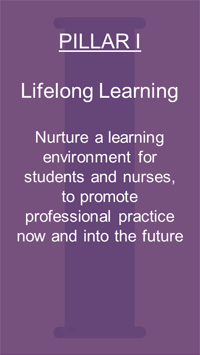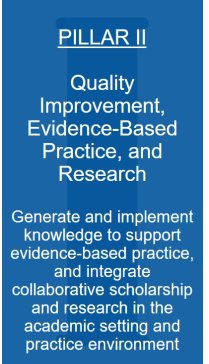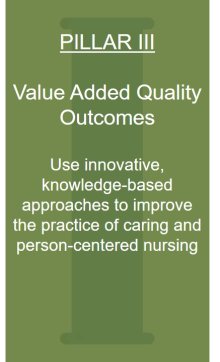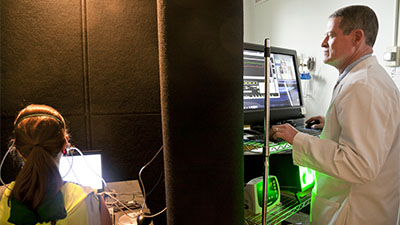Pillars
Pillar I: Lifelong Learning
Co-Directors: Pamela Edwards (DUHS) and Brigit Carter (DUSON)
One of DANCE’s three major pillars of growth, Pillar I encompasses a commitment to lifelong learning.
Transformative learning experiences begin during the pre-licensure student program and are highly dependent on exposure to learning opportunities with nurses who role model the characteristics of expert care providers.
Learning opportunities are also critical for graduate students who work collaboratively with nurse experts to gain new knowledge and skills.
Career advancement for the nurse in practice requires experiences in which the individual nurse sets career goals and obtains new knowledge, skills, support, and coaching from faculty to assist in achieving those goals.
The goals of Pillar I include:
- Aligning student experiences with the needs of the students, the organization and the health system
- Collaborating on educational funding initiatives to increase outcomes data for nursing-led models of care
- Maximizing the intellectual property and expertise of students, faculty, and nurses at all levels to capitalize on opportunities influencing the direction of the Duke Nursing brand
- Promoting initiatives that support and advance aspirational career and professional development
- Engaging all nurses across both settings in awareness of the shared collaborative
Pillar II: Quality Improvement, Evidence-Based, and Research
Co-directors: Bradi Granger (DUSON) and Deborah "Hutch" Allen (DUHS)
One of DANCE’s three major pillars of growth, Pillar II encompasses a commitment to quality improvement, evidence-based and research.
An expanded knowledge base regarding existing evidence and the tools and skills required to implement that evidence into clinical practice, engage nurses in contributing to increasing access to care, improving outcomes based on high-quality interventions, and developing highly effective, efficient care models that will reduce the cost of care.
Using evidence-based interventions reduces gaps in care and improves the quality of care delivery by addressing the Institute of Medicine’s six hallmarks of quality healthcare:
- Safety
- Effectiveness
- Efficiency
- Timeliness
- Patient-centeredness
- Equitable care
The goals and activities of Pillar II include:
- Support the development of the knowledge, skills and appreciation of quality improvement, EBP, and research for the improvement of patient outcomes.
- Mitigating the Madness 3-part EBP workshop series Integration of M&M with Clinical Ladder in 2019
- Minute for Mentors
- EBP Component in Nursing Leadership Development Program
- Provide mentorship as Clinical Ladder Advisors
- DUHS EBP Fellows (starting July 2019)
- DUHS Nursing Research Scholars (starting July 2019)
- Promote the implementation of quality-focused nursing initiatives that advance the nursing profession and improve clinical outcomes.
- Duke IHI Chapter partnership (QISP and QTP)
- DNP QI Elective (Quality Transformation in Organizational Settings)
- Mentorship for nurse-led research and EBP
- Support the dissemination of nurse-led QI, EBP, and research projects.
- Monthly dissemination/writing workshops (coming soon)
- EBP Conference (coming soon)
More Information:
- 2020 Mitigating the Madness EBP Series
- Approaches to Clinical Inquiry: focuses on formalizing clinical inquiry through PICOT and searching and appraising the literature.
- Approaches to Project Development and Implementation: focuses on the literature appraisal and project development and outcome measurement
- Approaches to Project Dissemination: focuses on disseminating project successes through abstract submission, poster development, manuscript preparation, and presentation essentials.
- Iowa Model of Evidence-Based Practice
- N971 Quality Transformation in Organizational Settings Course -
- The audit fee for participants not enrolled full-time as a Duke School of Nursing student is $160. Participants must be enrolled as a Duke School of Nursing non-degree student to register to audit the course. Contact Bradi Granger or Staci Reynolds for more information.
- Duke Institute for Healthcare Improvement -
- The meeting is held every fourth Thursday at 12 p.m. at Nosh. Contact Bradi Granger for more information.
- Sage Methods Minute
Pillar III: Value Added Quality Outcomes
Innovations and expertise from across the Duke Nursing enterprise can substantially advance clinical knowledge and improve overall patient care. Support is provided to nurses and students to transform how they work and use innovative, knowledge-based approaches to improve the practice of caring and ultimately provide preeminent person-centered nursing. The DANCE academic-practice partnership strives to cultivate mutually beneficial opportunities between DUHS and DUSON to design, test, and implement clinical practice innovations. These opportunities will strengthen nurses as transformational leaders and broaden their ability to integrate and influence high-reliability care in organizations.
The goals of Pillar III include:
- Assisting RNs in developing leadership skills that foster creativity and innovation to address current and future needs in the delivery of trans-disciplinary healthcare
- Supporting faculty in clinical practice
- Many DUSON faculty members practice clinically within DUHS in NP and CNS roles within various departments, including infection prevention, cardiology, and endocrine. Conversely, there are also several clinical leaders who serve as consulting associates at DUSON, providing guest lectures or teaching courses.





